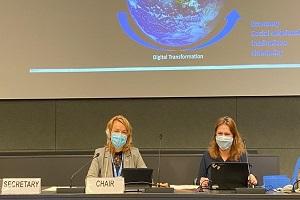
Effective public access to environmental information is critical for promoting a green and circular economy, increased biosafety and community resilience. The need to further such access using modern digital technologies has been increasingly voiced across countries in the light of the coronavirus disease (COVID-19) pandemic and pressing environmental challenges such as climate change, loss of biodiversity and plastic pollution.
In order to exchange experiences regarding this demanding subject, representatives of Governments, intergovernmental and non-governmental organizations, academia and other stakeholders joined the seventh meeting of the Task Force on Access to Information under the Convention on Access to Information, Public Participation in Decision-making and Access to Justice in Environmental Matters (Aarhus Convention) (online, 16 and 17 November 2020). The meeting focused on public access to environment-related product information and to information with respect to genetically modified organisms (GMOs), as well as on electronic tools supporting such access. Representatives of Albania, Belarus, France, Kazakhstan, Malta, Serbia, the European Commission, the European Environment Agency, the European Ombudsman and several non-governmental organizations (NGOs) shared a number of good practices and challenges in these matters. The representatives of the United Nations Environment Programme (UNEP), the United Nations Educational, Scientific and Cultural Organization (UNESCO), the secretariat of the Convention on Biological Diversity and the United Nations Office for Disaster Risk Reduction highlighted the related key developments.
Opening the meeting, the Chair, Her Excellency Ms. Tatiana Molcean, Ambassador and Permanent Representative of the Republic of Moldova to the United Nations Office and other international organizations in Geneva, stated that: “I am pleased to see that, in the recent years, most Parties to the Aarhus Convention continued developing regulatory and voluntary tools and measures to inform the public regularly of the environmental impact of operators’ activities and products. Such measures are cornerstones in the transition towards green and circular economy, implementing zero wastes approaches and enablers for a number of Sustainable Development Goals such as SDG 8 (Decent Work and Economic Growth), SDG 11 (Resilient and Sustainable Cities), SDG 12 (Sustainable Consumption and Production) and SDG 13 (Climate Action)”.
The meeting resulted in a number of far-reaching outcomes. In recognition of the importance of public access to environment-related product information for a green and circular economy, these outcomes included a call for further measures to: (a) develop or improve the frameworks related to eco-labelling, energy-labelling, product passports, product declarations, warning labelling, green public procurement mechanisms and effective use of pollutant release and transfer registers; (b) support multi-stakeholder dialogues, bringing together various actors such as suppliers, producers, retailers, consumers and environmental NGOs, in order to promote consumer product transparency, traceability and accountability; and (c) promote the interoperability of product information systems using the best available state-of-the-art digital technologies and open data principles.
In order to advance access to information with respect to GMOs, countries should strive to implement the respective provisions of the Aarhus Convention and the Cartagena Protocol on Biosafety to the Convention on Biological Diversity in synergy. This approach would involve, among other things, improving the collection of data and information and their integration into the nationwide digital environmental information system and reporting on the state of the environment. The use of electronic information tools can facilitate reporting on and effective public access to such data and information. The involvement of Aarhus Centres, educational institutions, libraries and the media in raising awareness of GMO-related matters and providing assistance to the public on how to obtain access to information is considered to be instrumental.
The participants also discussed how to advance open data and digital initiatives in the environmental domain, strengthen digital environmental information systems in the light of the European Green Deal, and harness the benefits of open science, citizen science and other similar initiatives for environmental monitoring and environmental protection. In the light of the challenges and lessons learned in the context of the COVID-19 pandemic, the participants underscored the need to improve online access to information and its provision upon request in case of emergency situations and post-emergency recovery.
The outcomes of the meeting are expected to assist countries in achieving target 16.10 of the Sustainable Development Goals (Ensure public access to information and protect fundamental freedoms) and a number of other Sustainable Development Goals and targets. Furthermore, the outcomes contributed to the update of the Recommendations on electronic information tools that are being prepared for consideration by the Aarhus Convention’s Meeting of the Parties in 2021. The Recommendations are expected to help Parties and interested Governments in the region and beyond in shaping environmental information policies and promoting digital transformation.
Meeting web page:
Task Force on Access to Information under the Aarhus Convention:
www.unece.org/index.php?id=53318
Useful resource: https://aarhusclearinghouse.unece.org/

